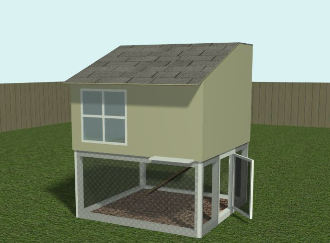Everyone is talking about chicken coops these days, and everyone is interested in the idea of having their own farm fresh eggs available to them right in their own backyard. But as you are coming to the realization of the matter, you also know that maybe you need a little advice before you begin, and this is a great step in the right direction.
Building your very own chicken coop can be very rewarding, but you need to consider some specific things first.
Ordinances:
City building ordinances can be an issue for some of you, so make sure you check to find out if you are allowed to build a chicken coop in your backyard, or if there are regulations that you must be aware of.
Space:
Do you understand how much space is required per chicken? Is the area in which you intend to build big enough for this structure? If you’re not sure of what exactly your plans are, or how many chickens you intend to house, you may want to build your coop larger then you expect to, just to avoid any future problems.
Ventilation:
Air circulation is a must for you, as well as your new pet poultry. For healthier chickens and more egg production, you must make sure you coop is ventilated properly.
Feeding and Lighting:
Two important factors in a good set of chicken coop building plans will include easy access to feed your pets, as well as lighting. Not only a light source for your access, but also an adequate amount of natural light.
The above concerns can not be overlooked, so make sure you take the time too check into these specific items before beginning building our chicken coop. And with the right information and the quality design you will be sure to enjoy this chicken coop for years to come.
Believe it or not, if done properly, chickens require very little supervision and very little maintenance.
For some great quality chicken coop building plans please visit my site at Backyard Chicken Coops.
Chicken Coop Plans Now to get expert advice on structurally building your coop.
A short clip created for the UMass Sustainable Agriculture class on how industrial chickens are raised.



19 Responses to Chicken Coop Building Plans – Farm Fresh Eggs Everyday! : chicken farming